#anxietymanagement
Text
Summary of Atomic Habits by James Clear. This book examines the psychology and science behind how habits form and provides practical strategies to build good habits and break bad ones.
➰The Habit Loop
Habits form through a simple loop - cue, craving, response, reward. Identifying these components allows us to reshape habits.
◾◼️⬛The Compounding Power of Small Changes
Atomic habits are tiny changes that accumulate into remarkable results, like compound interest. Focus on small improvements consistently.
💠Making Habits Obvious
Create visual reminders and cues. Make good habits visible and bad habits invisible. Harness habit stacking and temptation bundling.
─────────────────────────────
"Before we continue, please suggest in the comment section what book I should summarize next."
─────────────────────────────
📈Increasing Desire and Frequency
Make habits attractive. Add satisfaction and enjoyment to the habit routine. Leverage our natural cravings and sense of identity.
🔕Shaping Your Environment
Design your environment and context to make good habits easy and bad habits difficult. Control cues, remove triggers.
📐Measuring Habits
Tracking habits creates awareness that leads to improvement. Monitor progress, but focus on consistency over perfection.
⌛Maintaining Habits Long-Term
Habit change is a slow process of small tweaks iterated over time. Make tiny changes and build momentum. Don't quit at the first sign of struggle.
🤝The Role of Community
Surround yourself with people who have positive habits. Leverage accountability partners. Make habit change social.
😇Skill vs. Habit
Focus on building diligent habits over talent. Maintain high standards and emotional commitment to fuel motivation.
💯Avoiding Extremes
Allow for flexibility and balance in habits. Habits support but don't fully define your identity. Moderation helps habits last.
#personaldevelopment#selfimprovement#selfactualization#motivation#habitformation#goalsetting#mindfulness#meditation#successprinciples#lifegoals#positivethinking#emotionalintelligence#creativity#productivity#timemanagement#declutter#focus#stressmanagement#anxietymanagement#confidence#communicationskills#leadership#relationships#parenting#health#wellness#fitness#diet#addiction#behaviorchange
40 notes
·
View notes
Text
Embracing Stress: A Guide to Turning Worry into Wonder
Unlock your potential with our stress-busting tips! Discover mindfulness, resilience, and positivity strategies for a happier you. #StressManagement #PersonalGrowth #Mindfulness
Hey there, fellow traveler on the rollercoaster of life! Today, we’re diving deep into the realms of stress and worry. Yes, you read that right — we’re going to tackle those seemingly daunting monsters that love to crash our party uninvited.
Photo by cottonbro studio on Pexels.com
But fear not, because we’re going to learn how to not just deal with them, but also harness their power to propel…

View On WordPress
#AnxietyManagement#CopingStrategies#EmotionalResilience#EmotionalWellness#growthmindset#HappinessHabits#HealthyMindset#LifeSkills#MentalHealth#MentalHealthAwareness#MindBodyConnection#mindfulness#MindfulnessMeditation#MindfulnessPractices#PersonalDevelopment#PositivePsychology#PositiveThinking#ProductivityHacks#ResilienceBuilding#SelfAwareness#SelfCare#SelfDiscovery#SelfImprovement#StressManagement#StressManagementTipsCopingStrategies#StressRelief#WellbeingTips#Wellness#WellnessJourney#adventure
0 notes
Text
youtube
0 notes
Link
Mental Health Resources For Remote Working Parents: Therapy, Online Support Groups, And Strategies For Managing Stress And Anxiety
0 notes
Text
Are there any alternative or complementary therapies that can be beneficial for managing social anxiety symptoms?
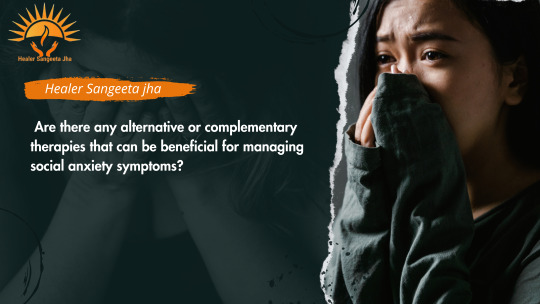
Certainly! As an expert practitioner specializing in healing and therapy, Sangeeta Jha can offer several alternative or complementary therapies that can be beneficial for managing social anxiety symptoms. Here are some informative answers for you :
Mindfulness-Based Stress Reduction (MBSR): MBSR is a structured program that incorporates mindfulness meditation, body awareness, and yoga to help individuals become more aware of their thoughts and feelings without judgment. It can be particularly effective in reducing social anxiety and improving overall well-being.
Yoga and Meditation: Incorporating regular yoga practice and meditation can be highly beneficial for managing social anxiety. Yoga helps with relaxation, body awareness, and breath control, while meditation promotes a calm and focused mind, reducing anxiety symptoms over time.
Energy Healing: Modalities such as Reiki, Pranic Healing, or Energy Psychology techniques like Emotional Freedom Technique (EFT) can help balance the body's energy system and release emotional blockages that contribute to social anxiety. These practices can promote relaxation, reduce stress, and enhance emotional resilience.
Aromatherapy: The use of essential oils like lavender, chamomile, or frankincense can have calming effects on the mind and body, making them useful for managing anxiety symptoms. Aromatherapy can be combined with other healing modalities for a holistic approach to anxiety management.
Herbal Remedies: Certain herbs like passionflower, valerian root, or lemon balm have natural calming properties and can be used as supplements or teas to help reduce anxiety levels. However, it's essential to consult with a qualified herbalist or healthcare provider before using herbal remedies, especially if taking other medications.
Sound Therapy: Sound healing techniques such as Tibetan singing bowls, crystal bowls, or binaural beats can promote relaxation, reduce stress, and create a peaceful environment conducive to managing social anxiety symptoms.
Art Therapy: Engaging in creative activities like painting, drawing, or sculpting can be therapeutic for individuals with social anxiety. Art therapy allows for self-expression, stress relief, and exploration of emotions in a non-verbal way.
Integrating these approaches with conventional treatments or therapy can enhance the overall effectiveness of managing social anxiety symptoms.
#complementarytherapies#healingmodalities#mindfulness#yogaandmeditation#energyhealing#aromatherapy#herbalremedies#soundtherapy#arttherapy#holisticwellness#anxietymanagement#mentalhealthsupport#selfcarejourney
0 notes
Text
Matthew Danchak's Advice for Managing Anxiety in Today's World

In our fast-paced, digitally connected world, anxiety has become a common struggle for many. From the pressures of work to the constant stream of information on social media, there are countless factors contributing to feelings of overwhelm. Matthew Danchak, a mental health professional, shares some practical tips for dealing with anxiety in the modern world.
Understanding Anxiety
Anxiety is a natural response to stress, but when it becomes too much to handle, it can significantly impact our lives. Matthew Danchak stresses the importance of recognizing the signs of anxiety, which can include feelings of worry, nervousness, or unease, as well as physical symptoms like a racing heart or sweating palms.
Practical Tips for Coping with Anxiety
Matthew Danchak suggests several strategies for managing anxiety:
Practice Mindfulness: Taking a few minutes each day to practice mindfulness or meditation can help calm the mind and reduce anxiety levels. Start with short sessions and gradually increase the duration as you become more comfortable.
Limit Social Media and News Consumption: The constant barrage of news and information on social media can exacerbate feelings of anxiety. Matthew Danchak recommends setting limits on your social media use and taking breaks when needed.
Establish a Routine: Creating a daily routine can provide a sense of structure and stability, which can be comforting for those dealing with anxiety. Include activities that promote relaxation and self-care, such as exercise, hobbies, or spending time outdoors.
Seek Professional Help: If anxiety is significantly impacting your daily life, Matthew Danchak advises seeking help from a mental health professional. Therapy, medication, or a combination of both may be recommended to help manage anxiety symptoms.
Conclusion
Managing anxiety in today's world can be challenging, but with the right strategies and support, it is possible to find relief. Matthew Danchak's advice offers a compassionate and practical approach to navigating anxiety in our modern lives, emphasizing the importance of prioritizing mental health and well-being.
#AnxietyManagement#MentalHealthAwareness#SelfCareTips#Mindfulness#StressRelief#HealthyLiving#AnxietySupport#Therapy#WellnessWednesday#SelfImprovement#MentalHealthMatters#Matthewdanchak
0 notes
Text
How to Fall Asleep with Anxiety: 7 Proven Strategies of 2024 for Rapid Relaxation and Positive Sleep

How to Fall Asleep with Anxiety: 7 Proven Strategies of 2024 for Rapid Relaxation and Positive Sleep
"Discover 2024's proven strategies for rapid relaxation and positive sleep. Learn how to fall asleep with anxiety effectively."
Introduction to How to Fall asleep with Anxiety!
Welcome to "How to Fall Asleep with Anxiety: 7 Proven Strategies of 2024 for Rapid Relaxation and Positive Sleep." Battling anxiety during bedtime is a universal challenge, and this article is your guide to conquering it. In the fast-paced world of 2024, sleep is more crucial than ever, and we bring you cutting-edge strategies to swiftly soothe your mind and embrace restful nights.
Let's delve into practical techniques, tailored for the unique landscape of anxiety-induced sleep struggles. Uncover the keys to serene slumber as we navigate through the latest insights to ensure your journey toward better sleep is both effective and empowering.
Unlock Tranquil Nights: How to Fall Asleep with Anxiety -Roadmap to Serenity
Do you struggle to fall asleep because of anxiety? Tossing and turning, unable to quiet your mind? Sleepless nights can take a toll on your well-being, making it even harder to manage anxiety. But what if there were proven strategies to help you, how to fall asleep with anxiety? Techniques that promote rapid relaxation and positive sleep?
In this comprehensive guide, we will explore seven strategies that have been proven effective for falling asleep with anxiety. From creating a tailored sleep environment to incorporating relaxation techniques into your nightly routine, we will provide you with the tools you need to experience restful nights and wake up refreshed.
Key Takeaways:
- Create a comfortable sleep environment by optimizing room temperature, choosing the right mattress and bedding, and ensuring darkness for melatonin production.
- Develop a consistent sleep routine that signals to your body it's time to wind down and prepare for sleep.
- Incorporate relaxation techniques, such as the 4-7-8 breathing method, yoga and meditation, and progressive muscle relaxation, into your nightly routine to promote relaxation and reduce anxiety.
- Manage your exposure to light by creating a dark sleep environment and limiting artificial light before bed.
- Consider dietary factors that can enhance sleep quality and explore anxiety-induced insomnia solutions through diet.
By learning and implementing these strategies, you can reclaim the restful sleep you deserve and manage your anxiety more effectively.
An Overview of Anxiety and Sleep Challenges
Before diving into the strategies for falling asleep with anxiety, it's important to have a clear understanding of the relationship between anxiety and sleep. Anxiety can have a significant impact on sleep quality and can often lead to insomnia or other sleep disturbances. Sleep problems and anxiety often go hand in hand, creating a vicious cycle where anxiety causes sleep issues, and lack of sleep further exacerbates anxiety symptoms.
The sequel follows the impact of anxiety on sleep quality and the various causes of sleep issues in anxious individuals. Understanding the connection between anxiety and sleep will help you better comprehend the need for effective strategies to promote relaxation and positive sleep.
Tailoring Your Sleep Environment for Comfort
https://www.youtube.com/watch?v=jcprGTfC4vc
Creating a comfortable sleep environment is essential for falling asleep with anxiety. By optimizing your sleep environment, you can create a calming space that promotes relaxation and improves your sleep quality.
Optimal Room Temperature and Its Role in Sleep
One crucial factor in creating a comfortable sleep environment is maintaining an optimal room temperature. The ideal temperature for sleep is typically between 60- and 67-degrees Fahrenheit (15 to 19 degrees Celsius). Adjusting the thermostat to this range can help promote better sleep by providing a cool and comfortable atmosphere. It's important to find a temperature that suits your preferences, allowing your body to relax and regulate its temperature efficiently.
Choosing the Right Mattress and Bedding
The choice of mattress and bedding can significantly impact your sleep comfort. It's important to select a mattress that provides proper support and aligns with your sleeping preferences. Whether you prefer a firm or plush mattress, finding the right balance is crucial.
Additionally, investing in high-quality bedding with breathable materials can enhance your sleep experience by regulating body temperature and promoting air circulation. Consider factors such as mattress firmness, material composition, and personal comfort preferences when choosing the right mattress and bedding for your sleep environment.
The Importance of Darkness for Melatonin Production
Creating a dark sleep environment is essential for promoting optimal sleep quality. Darkness plays a crucial role in the production of melatonin, a hormone that regulates sleep-wake cycles. Exposure to light, especially blue light emitted by electronic devices, can disrupt melatonin production and interfere with your ability to fall asleep. To create a sleep-friendly environment, consider using blackout curtains or blinds to block out external light sources. Minimizing the use of electronic devices before bedtime can also help promote darkness and enhance melatonin production.
By optimizing room temperature, selecting the right mattress and bedding, and promoting darkness, you can create a calming ambiance conducive to relaxation and restful sleep.
Developing a Consistent Sleep Routine
Establishing a bedtime routine is essential for those struggling to fall asleep with anxiety. A consistent sleep schedule helps regulate the body's internal clock, making it easier to fall asleep and wake up at the desired times. By implementing a regular sleep routine, you can create a sense of predictability and signal to your body that it's time to wind down and prepare for sleep.
Creating an effective bedtime routine involves incorporating nighttime habits that promote better sleep and help manage anxiety. Here are some important elements to consider:
-
Set a consistent sleep schedule:
Go to bed and wake up at the same time every day, even on weekends. This helps regulate your body's natural sleep-wake cycle.
-
Create a calming pre-sleep ritual:
Engage in activities that promote relaxation, such as reading, taking a warm bath, or practicing mindfulness exercises.
-
Avoid stimulating activities before bed:
Limit or avoid exposure to bright screens (phones, tablets, TVs) and stimulating activities that can interfere with sleep, such as intense exercise or engaging in intense discussions.
-
Create a sleep-friendly environment:
Make your bedroom a comfortable and peaceful space. Consider using earplugs, an eye mask, or a white noise machine to block out disruptive noises.
-
Avoid caffeine and heavy meals close to bedtime:
Consuming caffeine or eating large meals shortly before bed can interfere with sleep. Opt for herbal tea or a light snack if necessary.
-
Practice relaxation techniques:
Incorporate relaxation techniques into your bedtime routine, such as deep breathing exercises or gentle stretching, to calm your mind and body.
A consistent sleep routine can have a substantial positive impact on both sleep quality and anxiety levels. By establishing healthy nighttime habits and adhering to a regular sleep schedule, you can create a conducive environment for better sleep and manage anxiety more effectively.
How to Fall Asleep with Anxiety - Introducing Relaxation Techniques into Your Nightly Routine

How to Fall Asleep with Anxiety AI Image
Incorporating relaxation techniques into your nightly routine can help reduce anxiety and promote relaxation, making it easier to fall asleep.
We will provide a detailed explanation of the 4-7-8 breathing method, a simple yet powerful breathing technique to induce relaxation. Additionally, we will discuss the benefits of practicing yoga and meditation before bed for pre-sleep relaxation. Finally, we will explore progressive muscle relaxation, a technique that involves systematically tensing and relaxing different muscle groups to promote overall relaxation.
By incorporating these relaxation techniques into your nightly routine, you can calm your mind and body, facilitating a peaceful transition into sleep.
The 4-7-8 Breathing Method Explained
The 4-7-8 breathing method is a relaxation technique that can help alleviate anxiety and promote calmness. This technique involves inhaling through your nose for a count of 4, holding your breath for a count of 7, and exhaling through your mouth for a count of 8. The 4-7-8 breathing method can activate the body's relaxation response and help reduce stress and anxiety before bed. Practicing this technique for a few minutes each night can promote relaxation and improve your sleep quality.
How to Fall Asleep with Anxiety -Yoga and Meditation for Pre-Sleep Relaxation
Engaging in yoga and meditation before bed can be beneficial for individuals struggling with anxiety-induced insomnia. Yoga combines physical movement, breath control, and mindfulness, promoting relaxation and reducing anxiety. Practicing gentle yoga poses and focusing on deep breathing can help calm the mind and prepare the body for sleep. Similarly, incorporating meditation techniques, such as mindfulness meditation or guided imagery, can help alleviate anxiety and promote relaxation. By incorporating yoga and meditation into your nightly routine, you can create a sense of peace and tranquility that supports restful sleep.
Progressive Muscle Relaxation to Unwind
Progressive muscle relaxation is a technique that involves systematically tensing and relaxing different muscle groups to promote overall relaxation. This technique can help reduce muscle tension, release physical stress, and alleviate anxiety.
To practice progressive muscle relaxation, start by tensing a specific muscle group, such as your hands or shoulders, for a few seconds, and then consciously release the tension while focusing on the sensation of relaxation. Gradually work your way through each muscle group in your body, from head to toe.
By incorporating progressive muscle relaxation into your nightly routine, you can unwind both physically and mentally, allowing for a more peaceful and restful sleep.
How Exposure to Light Influences Your Sleep Quality
Exposure to light plays a significant role in regulating sleep-wake cycles and impacting sleep quality. Understanding how light influences your sleep can help you better manage anxiety-induced insomnia.
Light exposure has a direct effect on your body's production of melatonin, a hormone that helps regulate sleep. Increased exposure to light, especially blue light emitted by electronic devices, can suppress melatonin production, making it difficult to fall asleep and stay asleep. This is particularly important for individuals with anxiety, as poor sleep quality can exacerbate anxiety symptoms.
How to Fall Asleep with Anxiety - Strategies for Dark sleep Environment
Here are some strategies to consider:
- Limit exposure to artificial light before bed: Minimize the use of electronic devices such as smartphones, tablets, and TVs close to bedtime. The blue light emitted by these devices can interfere with melatonin production and disrupt your sleep.
- Create a dark bedroom: Use blackout curtains or blinds to block out external light, streetlights, or early morning sunlight. This can help create a conducive environment for restful sleep.
- Avoid bright alarm clocks: Opt for alarm clocks with dim settings or utilize blackout covers to prevent light disturbances during the night.
How to Fall Asleep with Anxiety -Dietary Considerations for Better Sleep Amid Anxiety
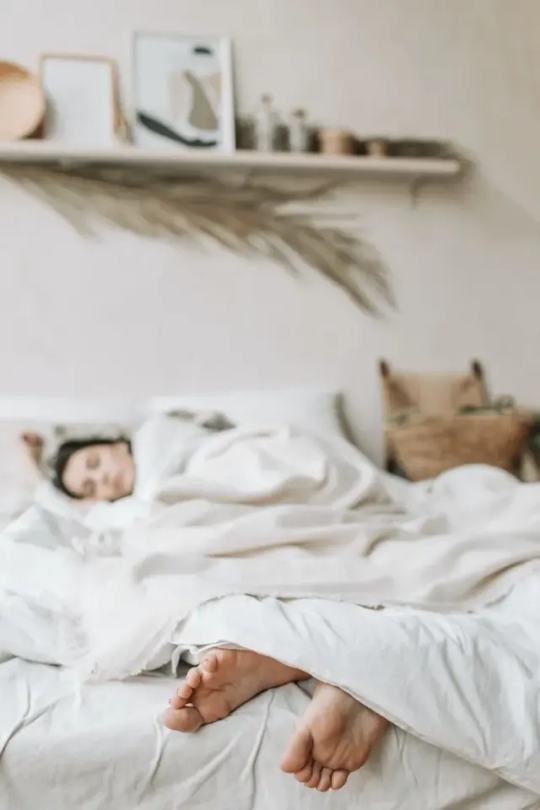
How to Fall Asleep with Anxiety Image Credit: Photo by Vlada Karpovich: https://www.pexels.com/photo/photo-of-a-woman-sleeping-on-a-bed-with-a-white-blanket-5357328/
Diet plays a crucial role in overall health and can significantly impact sleep quality, especially for individuals with anxiety. By adopting a sleep-friendly diet, you can nourish your body and promote relaxation, improving your ability to fall asleep with anxiety.
How to Fall Asleep with Anxiety -Impact of Eating Patterns on Sleep
Eating patterns and meal timing can have a direct influence on your sleep quality. Irregular eating schedules, late-night snacking, or consuming heavy meals close to bedtime can disrupt your sleep. It's best to establish a routine by having regular mealtimes and avoiding heavy meals at least two to three hours before bed.
Foods and Nutrients That Enhance Sleep Quality
Certain foods and nutrients can promote better sleep by calming the mind and enhancing relaxation. Consider incorporating the following sleep-friendly options into your diet:
-
Foods rich in tryptophan:
Tryptophan is an amino acid that helps produce serotonin and melatonin, hormones that regulate sleep. Good sources of tryptophan include turkey, chicken, eggs, dairy products, nuts, and seeds.
-
Complex carbohydrates:
Foods like whole grains, legumes, and vegetables are rich in complex carbohydrates that help stimulate the release of insulin. This insulin promotes the uptake of amino acids, including tryptophan, into the brain, supporting better sleep.
-
Magnesium-rich foods:
Magnesium is a mineral that plays a role in promoting relaxation and improving sleep quality. Include magnesium-rich foods in your diet, such as leafy green vegetables, nuts, seeds, and whole grains.
-
Foods high in vitamins B6 and B12:
These vitamins are involved in the production of neurotransmitters, including serotonin and melatonin, which are essential for regulating sleep. Good sources of vitamin B6 and B12 include fish, poultry, eggs, leafy green vegetables, and fortified cereals.
-
Herbal teas:
Certain herbal teas like chamomile, lavender, and valerian root have calming properties and can aid in relaxation before bedtime. Enjoying a cup of herbal tea as part of your evening routine may help promote better sleep.
By incorporating these sleep-enhancing foods and nutrients into your diet, you can support relaxation, improve sleep quality, and manage anxiety-induced insomnia through diet.
How to Fall Asleep with Anxiety - Sleep Promoting Diet Plan
Foods and Nutrients
Benefits
Tryptophan-rich foods
Promote the production of sleep-regulating hormones like serotonin and melatonin.
Complex carbohydrates
Stimulate the release of insulin, aiding in the uptake of tryptophan into the brain.
Magnesium-rich foods
Promote relaxation and improve sleep quality.
Foods high in vitamins B6 and B12
Support the production of sleep-regulating neurotransmitters.
Herbal teas
Provide calming properties and aid in relaxation before bed.
How to Fall Asleep with Anxiety
Falling asleep with anxiety can be a challenge, but there are effective strategies that can help you manage anxiety-induced insomnia and promote positive sleep. Throughout this article, we have discussed various techniques and tips aimed specifically at improving sleep quality for individuals with anxiety. Now, let's consolidate and summarize these strategies to provide you with a comprehensive guide on how to fall asleep with anxiety.
1. Tailor Your Sleep Environment:
Create a comfortable sleep environment by optimizing your room temperature, choosing the right mattress and bedding, and ensuring darkness for melatonin production.
2. Develop a Consistent Sleep Routine:
Establish a bedtime routine with nighttime habits that signal your body it's time to relax and prepare for sleep.
3. Introduce Relaxation Techniques:
Incorporate relaxation techniques such as the 4-7-8 breathing method, yoga, meditation, and progressive muscle relaxation into your nightly routine to calm your mind and body.
4. Manage Exposure to Light:
Be mindful of light exposure, create a dark sleep environment, and limit exposure to artificial light before bed.
5. Consider Dietary Factors:
Adopt a sleep-friendly diet by maintaining regular eating patterns and including foods and nutrients that enhance sleep quality.
6. Utilize Physical Activity:
Engage in regular physical activity, both indoors and outdoors, to manage anxiety and promote better sleep.
7. Harness the Power of Sound and Music:
Incorporate calming sounds and music into your bedtime routine to induce sleep and relaxation.
By implementing these strategies, you can create an optimal sleep environment, manage anxiety, and improve your ability to fall asleep with anxiety. Remember, finding the methods that work best for you may take time and experimentation. Consult with a healthcare professional for personalized advice if you consistently struggle with anxiety and sleep issues.
Read the full article
#anxietycoping#AnxietyManagement#anxietyrelief#CalmingTechniques#CopingStrategies#emotionalwell-being#healthysleep#HolisticHealth#mentalhealth#MentalWellness#mind-bodyconnection#MindfulnessPractices#overcominginsomnia#positivesleephabits#relaxationtechniques#restfulsleep#Self-CarePractices#serenitytechniques#sleephygiene#sleepimprovement#sleeproutine#sleepsolutions#sleeptips#stressreduction#wellnessstrategies
0 notes
Text
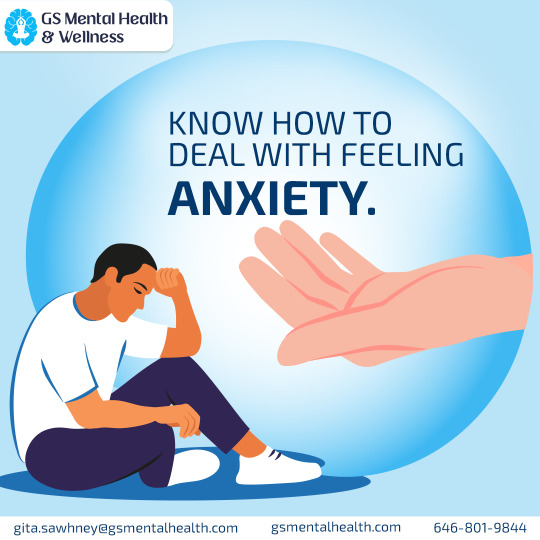
Navigating Anxiety: Practical Strategies to Calm Your Mind and Find Peace with GS Mental Health & Wellness
Everyone experiences anxiety from time to time, but when it becomes persistent or overwhelming, it can significantly impact your quality of life. This guide provides a comprehensive overview of effective techniques for managing anxiety and reclaiming your sense of calm.
0 notes
Text
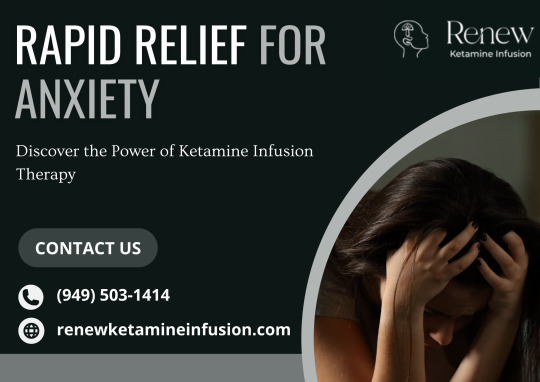
Rapid Relief for Anxiety
Experience rapid relief from anxiety with the power of ketamine infusion therapy. Ketamine infusion is an innovative treatment method that has shown promising results in alleviating symptoms of anxiety disorders. This therapy involves the administration of a low dose of ketamine, a dissociative anesthetic, in a controlled medical setting. Ketamine works by targeting the brain's receptors and helping to regulate mood and reduce anxiety. Unlike traditional treatments, ketamine infusion offers fast-acting relief, often within hours or days, making it an effective option for individuals seeking immediate relief from anxiety symptoms. Discover the transformative potential of ketamine infusion therapy and regain control over your anxiety.
0 notes
Text
What are some strategies for managing anxiety and panic attacks?

Understanding Anxiety and Panic Attacks
Definition of Anxiety and Panic Attacks
Anxiety is a natural response to stress, characterized by feelings of fear or apprehension about what's to come. It can manifest in various forms, such as generalized anxiety disorder, social anxiety disorder, and specific phobias. On the other hand, panic attacks are sudden episodes of intense fear that trigger severe physical reactions when there is no real danger or apparent cause. They are a symptom of panic disorder, a type of anxiety disorder.
Common Symptoms of Anxiety and Panic Attacks
While symptoms can vary, common signs of anxiety include restlessness, excessive worry, and difficulty concentrating. Panic attacks, however, are often more intense and may include palpitations, sweating, trembling, shortness of breath, and a feeling of impending doom.
Causes and Triggers of Anxiety and Panic Attacks
Both anxiety and panic attacks can be triggered by various factors, including genetics, brain chemistry, personality, and life events. Stressful situations, certain health conditions, and even certain substances or medications can also trigger these conditions.

Photo by Leeloo Thefirst on Pexels
Strategies for Managing Anxiety
Mindfulness Techniques
Mindfulness techniques can help manage anxiety by bringing your attention to the present moment. This can help you break free from the cycle of negative thought patterns that fuel anxiety.
Deep Breathing Exercises
Deep breathing can help to reduce anxiety by slowing your heartbeat and lowering or stabilizing your blood pressure. This technique involves inhaling deeply through your nose, holding your breath for a few seconds, and then exhaling slowly through your mouth.
Meditation and Yoga
Both meditation and yoga can help to reduce anxiety by promoting relaxation and stress reduction. Regular practice can help to improve your mental well-being and overall quality of life. For more information on these techniques, visit our post on how to manage stress and anxiety every day.
Cognitive Behavioral Techniques
Cognitive behavioral techniques can help you to identify and challenge negative thought patterns, helping to reduce anxiety.
Identifying and Challenging Negative Thoughts
Identifying your negative thoughts and challenging them can help to reduce anxiety. This involves recognizing your anxious thoughts, assessing their validity, and replacing them with more positive or realistic thoughts.
Exposure Therapy
Exposure therapy involves gradually and repeatedly facing your fears until they no longer cause you anxiety. This technique can be particularly effective for specific phobias and obsessive-compulsive disorder.
Lifestyle Changes
Making certain lifestyle changes can also help to manage anxiety.
Regular Exercise
Regular exercise can help to reduce anxiety by boosting your mood and acting as a natural stress reliever. Aim for at least 30 minutes of moderate-intensity exercise most days of the week.
Balanced Diet
A balanced diet can also help to reduce anxiety. Try to incorporate a variety of fruits, vegetables, lean proteins, and whole grains into your diet, and limit your intake of processed foods and sugary drinks.
Adequate Sleep
Getting enough sleep is crucial for managing anxiety. Aim for 7 to 9 hours of sleep per night, and try to maintain a consistent sleep schedule.
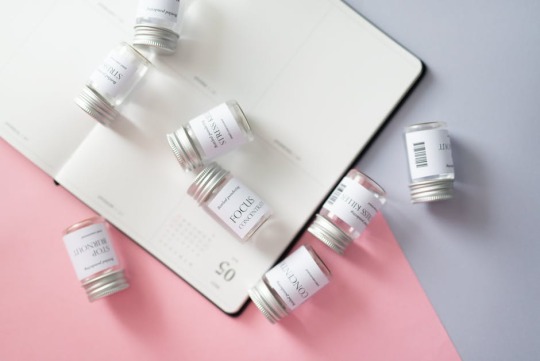
Photo by Leeloo Thefirst on Pexels
Strategies for Managing Panic Attacks
Grounding Techniques
Grounding techniques can help to manage panic attacks by helping you to stay connected to the present moment.
The 5-4-3-2-1 Method
The 5-4-3-2-1 method involves identifying five things you can see, four things you can touch, three things you can hear, two things you can smell, and one thing you can taste. This technique can help to distract you from your panic symptoms and bring you back to the present moment.
Focusing on an Object
Focusing on an object can also help to manage panic attacks. This involves choosing an object and focusing all your attention on it, noting its color, shape, texture, and other details.
Relaxation Techniques
Relaxation techniques can help to reduce the intensity of panic attacks.
Progressive Muscle Relaxation
Progressive muscle relaxation involves tensing and then releasing different muscle groups in your body, which can help to promote relaxation and reduce panic symptoms.
Visualization of a Peaceful Place
Visualization involves imagining a peaceful place or situation. This can help to distract you from your panic symptoms and promote relaxation.
Breathing Techniques
Breathing techniques can help to manage panic attacks by slowing your breathing and helping to reduce other panic symptoms.
Box Breathing
Box breathing involves inhaling, holding your breath, exhaling, and then holding your breath again, each for a count of four. This technique can help to slow your breathing and reduce panic symptoms.
Diaphragmatic Breathing
Diaphragmatic breathing involves breathing deeply into your diaphragm rather than shallowly into your chest. This can help to slow your breathing and reduce panic symptoms.

Photo by Leeloo Thefirst on Pexels
Role of Medication and Therapy in Managing Anxiety and Panic Attacks
Medication
Medication can be an effective part of treatment for both anxiety and panic attacks.
Types of Medication
Several types of medication can be used to treat anxiety and panic attacks, including selective serotonin reuptake inhibitors (SSRIs), benzodiazepines, and beta-blockers. Your healthcare provider can help you to determine which medication is right for you.
Importance of Adherence to Prescribed Medication
It's important to take your medication as prescribed by your healthcare provider. Not doing so can lead to a return of symptoms or other health problems.
Therapy
Therapy can be an effective treatment for both anxiety and panic attacks.
Cognitive Behavioral Therapy
Cognitive behavioral therapy (CBT) can help you to identify and change negative thought patterns that lead to anxiety and panic attacks. For more information on CBT, visit our post on complex anxiety stress relief.
Exposure Therapy
Exposure therapy can be particularly effective for treating panic disorder. This involves gradually and repeatedly facing your fears until they no longer cause you anxiety.
Mindfulness-Based Stress Reduction
Mindfulness-based stress reduction (MBSR) is a therapy program that combines mindfulness meditation and yoga to help reduce anxiety and panic attacks.

Photo by Pavel Danilyuk on Pexels
When to Seek Professional Help
Recognizing When Anxiety and Panic Attacks are Interfering with Daily Life
If anxiety or panic attacks are interfering with your daily life, it's important to seek professional help. This might include if you're avoiding certain situations due to fear of having a panic attack, if your anxiety is causing you distress, or if you're experiencing physical symptoms like chest pain or shortness of breath.
Finding a Mental Health Professional
Finding a mental health professional can be an important step in managing anxiety and panic attacks. This might include a psychiatrist, psychologist, or licensed counselor. For more information on finding a mental health professional, visit our post on 10 ways to manage stress and anxiety every day.
What to Expect in Therapy
In therapy, you'll work with your therapist to identify and change negative thought patterns, learn coping strategies, and possibly explore underlying issues that may be contributing to your anxiety or panic attacks.
Remember, it's okay to ask for help. If you're struggling with anxiety or panic attacks, reach out to a healthcare provider or mental health professional. You're not alone, and there are treatments available that can help.
#AnxietyManagement #AnxietyWarrior #AnxietyAwareness #AnxietyHelp #anxiety
For more information on managing anxiety and panic attacks, visit the following resources:
- Mayo Clinic Health System
- Medical News Today
- NHS Inform
FAQ: Strategies for Managing Anxiety and Panic Attacks
What is anxiety?Anxiety is a natural response to stress or danger. It is characterized by feelings of fear, worry, and unease. While it is normal to experience anxiety occasionally, excessive and persistent anxiety can interfere with daily life.
What are panic attacks?Panic attacks are intense episodes of fear or discomfort that can come on suddenly and peak within minutes. Symptoms may include a rapid heartbeat, shortness of breath, chest pain, dizziness, and a sense of impending doom. Panic attacks can be triggered by specific situations or can occur unexpectedly.
What are some strategies for managing anxiety?- Practice relaxation techniques such as deep breathing, progressive muscle relaxation, or meditation.
- Engage in regular physical exercise to reduce stress and promote the release of endorphins.
- Maintain a healthy lifestyle by getting enough sleep, eating a balanced diet, and limiting caffeine and alcohol intake.
- Challenge negative thoughts and replace them with positive and realistic ones.
- Seek support from friends, family, or a therapist to talk about your feelings and concerns.
How can I cope with panic attacks?- Learn and practice deep breathing exercises to help regulate your breathing during a panic attack.
- Ground yourself by focusing on your senses and the present moment. Name five things you can see, four things you can touch, three things you can hear, two things you can smell, and one thing you can taste.
- Use positive self-talk to remind yourself that panic attacks are temporary and will pass.
- Consider seeking professional help, such as therapy or medication, if panic attacks are significantly impacting your daily life.
Can lifestyle changes help manage anxiety and panic attacks?Yes, making certain lifestyle changes can be beneficial in managing anxiety and panic attacks. These include:
- Prioritizing self-care activities like exercise, healthy eating, and getting enough sleep.
- Avoiding or limiting the consumption of substances that can worsen anxiety, such as caffeine and alcohol.
- Engaging in stress-reducing activities like yoga, meditation, or hobbies you enjoy.
- Establishing a regular routine and setting realistic goals to reduce stress and promote a sense of control.
Are there any natural remedies for anxiety and panic attacks?While natural remedies may help some individuals, it is important to consult with a healthcare professional before trying any new treatments. Some natural remedies that may be beneficial include:
- Herbal supplements like chamomile, lavender, or valerian root.
- Aromatherapy using essential oils like lavender or bergamot.
- Regular exercise and physical activity to release endorphins and reduce stress.
- Mindfulness practices such as meditation or yoga.
How can I support someone experiencing anxiety or panic attacks?- Be patient and understanding, as anxiety and panic attacks can be overwhelming for the person experiencing them.
- Encourage them to seek professional help if needed and offer to accompany them to appointments if they feel comfortable.
- Learn about their triggers and help them create a safe and supportive environment.
- Offer reassurance and remind them that you are there to support them.
- Avoid minimizing their feelings or telling them to "just relax."
When should I seek professional help for anxiety and panic attacks?If anxiety or panic attacks significantly interfere with your daily life, it is advisable to seek professional help. Signs that it may be time to consult a healthcare provider include:
- Frequent and intense anxiety or panic attacks.
- Avoidance of situations or places due to fear of panic attacks.
- Difficulty functioning at work, school, or in relationships.
- Persistent worry or fear that lasts for weeks or months.
- Physical symptoms like chronic headaches, stomachaches, or fatigue.
Read the full article
0 notes
Text
How to Overcome Anxiety Self Doubt?
Overcoming performance anxiety and self-doubt can be challenging, but it is possible with the right strategies and mindset. Here are some steps to help you tackle these issues:
Acknowledge Your Feelings: The first step is to recognize that performance anxiety and self-doubt are normal feelings that many people experience. It's okay to feel nervous or doubtful sometimes; it doesn't mean you're not capable.
Preparation is Key: One of the most effective ways to combat anxiety and self-doubt is through thorough preparation. The more you know your material or task, the more confident you'll feel. Practice, study, or rehearse as much as you can to boost your competence.
Set Realistic Goals: Sometimes, self-doubt arises from setting overly ambitious or unrealistic goals. Break down your goals into smaller, achievable steps. Celebrate your successes along the way, no matter how small.
Positive Self-Talk: Replace negative thoughts with positive affirmations. Challenge your self-doubt with evidence of your past successes. Remind yourself of your strengths and accomplishments.
Visualization: Visualize yourself succeeding. Spend time imagining the positive outcomes of your performance. This can help build confidence and reduce anxiety.
Breathing Exercises: Deep breathing exercises can help calm your nerves. Try inhaling deeply for a count of four, holding for four, and exhaling for four. Repeat this several times before your performance.
Progressive Muscle Relaxation: Tension often accompanies anxiety. Progressive muscle relaxation involves tensing and then relaxing different muscle groups to reduce physical tension.
Mindfulness and Meditation: These practices can help you stay in the present moment and reduce anxiety. Regular mindfulness or meditation practice can improve your ability to handle stress and self-doubt.
Seek Support: Talk to friends, family, or a therapist about your feelings. Sharing your worries can provide relief and valuable perspectives.
Practice Under Pressure: Simulate the performance conditions as closely as possible during your practice sessions. This can help you become more comfortable with the actual performance environment.
Learn from Failure: Understand that failure is a natural part of growth. Don't let a setback define your self-worth. Instead, view it as an opportunity to learn and improve.
Focus on the Process, Not the Outcome: Instead of fixating on the end result, concentrate on the steps and effort you are putting into your performance. This shift in focus can alleviate pressure.
Use Positive Visualization: Imagine yourself succeeding in your performance. Create a mental image of a successful outcome to boost your confidence.
Consider Professional Help: If performance anxiety and self-doubt significantly impact your life or hinder your ability to perform, consider seeking help from a therapist or counselor. They can provide tailored strategies to address these issues.
Accept Imperfection: Understand that nobody is perfect, and mistakes happen to everyone. Embrace imperfection as a part of the human experience.
Remember that overcoming performance anxiety and self-doubt is an ongoing process. It may take time and consistent effort to build confidence and manage these feelings effectively. Be patient with yourself and keep practicing these strategies to improve over time.
#PerformanceAnxiety#SelfDoubt#ConfidenceBuilding#AnxietyManagement#SelfImprovement#MentalHealth#Mindfulness#PositiveThinking#Preparation#Visualization#StressManagement#SelfCare#Therapy#Mindset#GoalSetting#today on tumblr
1 note
·
View note
Text
youtube
#SleepMeditation#StressRelief#AnxietyManagement#GuidedMeditation#Relaxation#Wellbeing#Mindfulness#MentalHealth#Youtube
1 note
·
View note
Link
Harnessing the Power of Journaling: Managing Stress, Anxiety, and Anger Effectively
0 notes
Text
How to Deal with Stress and Anxiety
youtube
Dealing with stress and anxiety can be challenging, but there are effective strategies to help you manage these overwhelming feelings. In this video, we'll explore practical tips and techniques to cope with stress and anxiety, including deep breathing exercises, mindfulness practices, and more. Whether you're facing work-related stress, social anxiety, or just the everyday pressures of life, this video will provide you with valuable insights and tools to find calm and balance.
#StressRelief#AnxietyManagement#MentalHealthMatters#Mindfulness#CopingStrategies#StressFreeLiving#SelfCare#WellnessJourney#StayCalm#HealthyMindset#Youtube
0 notes
Text
8 Best Edibles for Anxiety Relief Naturally
#Ediblesforanxiety#anxietycure#anxietyrelief#anxietytips#anxietyfree#anxietysurvivor#anxiety#anxietysupport#anxietyhelp#anxietyreducer#anxietyattacks#anxietysufferer#anxietylife#anxietyreliever#anxietytreatment#anxietyprobs#anxietymanagement#anxietyhelper#overcominganxiety#anxietydepression#anxietyrecovery#anxietyrelieftips#anxietyaid#anxietyattack#anxietyissues#anxietyawareness#anxietystruggles#anxietyhealing#anxietysymptoms#anxietycoach
0 notes
Text
Build Stronger Bonds and Conquer Anxiety Together with Bonanza
Learn more at bonanzatouch.com or contact us at +91-79841-80255.
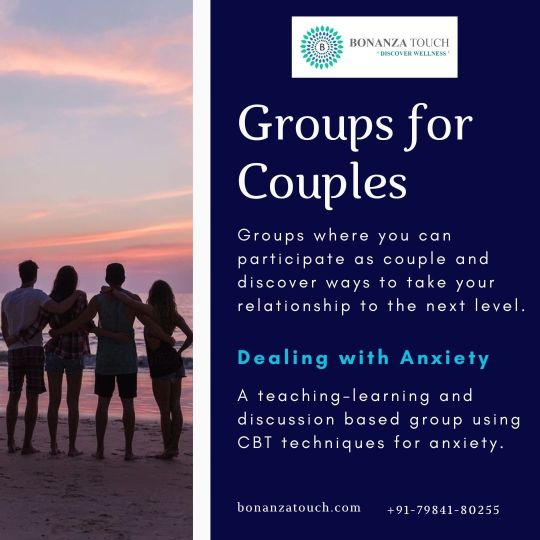
#CouplesGoals#AnxietyManagement#RelationshipWellness#Bonanzatouch#HealthyRelationships#MentalHealthMatters#SupportivePartnership#TogetherStronger#LoveAndSupport#EmotionalWellbeing#MindfulnessJourney#WellnessForTwo#RelationshipGoals#AnxietySupport#StressRelief#EmpowermentTogether#BetterTogether#JoinUsNow
0 notes